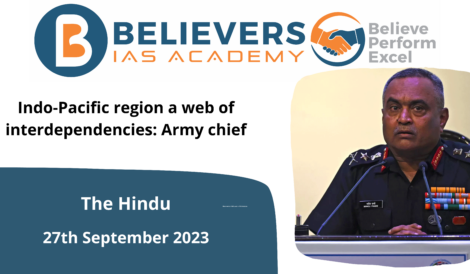India To Bridge The Language Gap With Neighbours
Context:
- India is looking to expand its cultural footprint in nations with which it has historical ties, including those in its immediate neighborhood. To facilitate better people-to-people exchanges, India plans to create a pool of experts in languages spoken in countries such as Myanmar, Sri Lanka, Uzbekistan, and Indonesia.
- The Indian Council for Cultural Relations (ICCR) has planned a special project dubbed ‘The Language Friendship Bridge,’ which will train five to ten people in each of these countries’ official languages.
Points to Ponder:
- Myanmar, Sri Lanka, Uzbekistan, and Indonesia have historical relations with India.
- The Indian Council for Cultural Relations (ICCR) is planning a project named “The Language Friendship Bridge” to build a pool of experts in these countries official languages.
- The ICCR has designated ten languages to train individuals in, including Kazakh, Uzbek, Bhutanese, Ghoti, Burmese, Khmer, Thai, Sinhalese, and Bahasa.
- With only a handful of institutes teaching the languages on the ICCR list, India has focused on acquiring European and major Asian economies’ languages.
- The ICCR is in contact with universities, institutes, and language experts to determine the best way to carry out the initiative.
- The project might be carried out by collaborations with instructors from these countries coming to teach courses in India or by providing scholarships to Indian students to study these languages in the countries where they are spoken.
- A good cultural setting is required to fully learn a language, and language experts should be properly exploited.
- There is an increasing need for a pool of translators and interpreters to help with medical tourism.
- Following the project’s launch, the ICCR intends to discuss increasing the present list of languages.
Universities can help with the Language Friendship Bridge project:
- The ICCR is in discussions with universities and institutes to determine the best way to carry out the project.
- Jawaharlal Nehru University, Delhi University, the English and Foreign Languages University in Hyderabad, Banaras Hindu University, and the Mahatma Gandhi Antarrashtriya Hindi Vishwa Vidyalaya in Wardha are all being consulted on the project.
- Universities can provide language courses in the ten languages on the ICCR list to interested students.
- Universities can work with institutions in the countries where these languages are spoken to help students study the language through exchange programs or scholarships.
- Experts in these languages can use universities to teach courses, conduct research, and share their knowledge and skills with students and scholars.
- Universities can assist in promoting the project and raising awareness among students, scholars, and the general public about the necessity of learning these languages and increasing cultural exchange between India and other nations.
Growing demand for language experts:
- India is broadening its cultural footprint in nations with which it has historical relations and intends to establish a pool of language experts to promote greater people-to-people exchanges.
- As a result, the Indian Council for Cultural Relations (ICCR) has developed a special project dubbed ‘The Language Friendship Bridge,’ which aims to train people in 10 languages spoken in countries such as Myanmar, Sri Lanka, Uzbekistan, and Indonesia.
- The expansion of cultural and economic relations between India and its neighboring nations is boosting the demand for language experts who can enable communication between India and these countries.
- For example, India is seeing an increase in medical tourism, with patients traveling from Turkey, Bangladesh, Afghanistan, and the Maldives for treatment. As a result, there is an urgent need for a pool of translators and interpreters to assist with their trips.
- To fulfill this expanding need, colleges and institutions are being consulted on project implementation methods, and experts believe that the list of languages should be expanded beyond the existing ten to include other languages in demand.
- The project’s launch this year will be followed by conversations about increasing the current list of languages, underlining the future need for more language experts.




